2021 Activity Report
March Report
31 March 2022
Global Japan Office Coordinator
Taguchi Kazumi
The March London Report is about an online talk organised by the Intercollegiate Development Discussion Panel (founded in 2000 by a group of Japanese students studying development in London). The topic for the 3rd study meeting was “Imagination/creativity – planet and international cooperation from an African viewpoint”, a talk given by a surgeon, Professor Tomohiko Sugishita who has been working on sustainable development in health and medical care in many African countries.
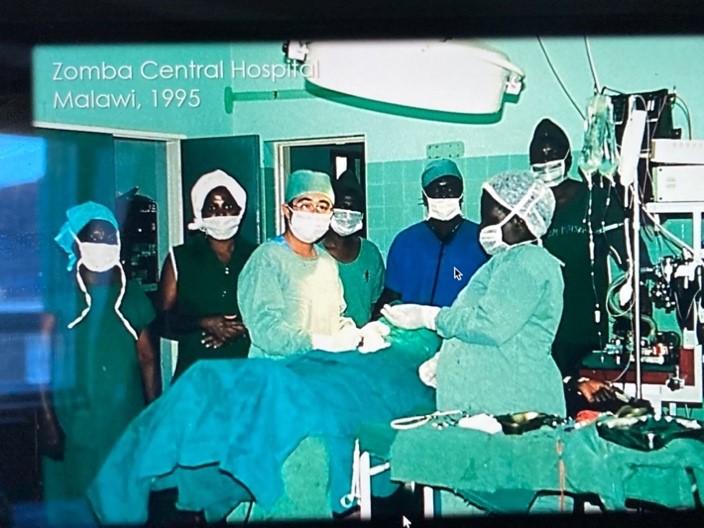
Professor Sugimoto working in Malawi in 1995.
Professor Sugishita has published many books, and you can find out all about his works and activities by searching on the internet. I will concentrate on summarising the main themes of his talk.
The first message is “don’t study passively, think from many directions and collect information”. He also introduced the idea “Mindset Change” and explained three types of thinking. The first one is “Great Mind” which make things happen. The second is “Average Mind” which observes things happening and the third one is “Simple Mind” which wonders what has happened.
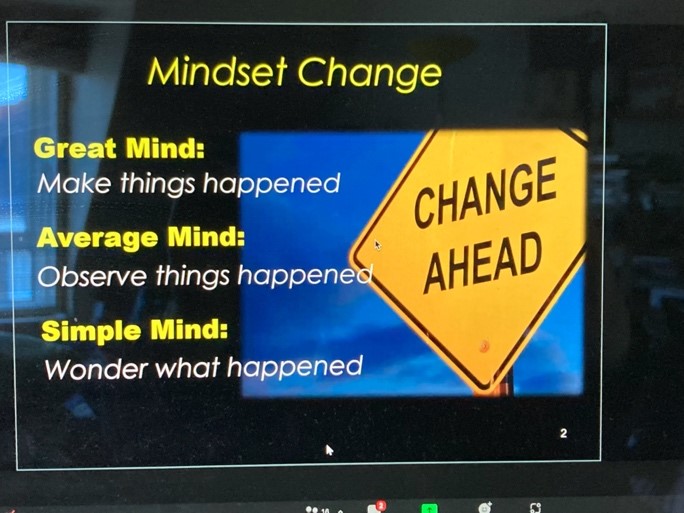
Professor Sugishita says it is important to have full awareness of two issues which are creativity and imagination. One has to be creative in order to overcome disparity, discrimination and prejudice. One also has to have imagination in order to foresee the unknown world.
These two types of awareness work as core motivations to ensure full commitment and satisfaction and sustain activities in difficult situations.
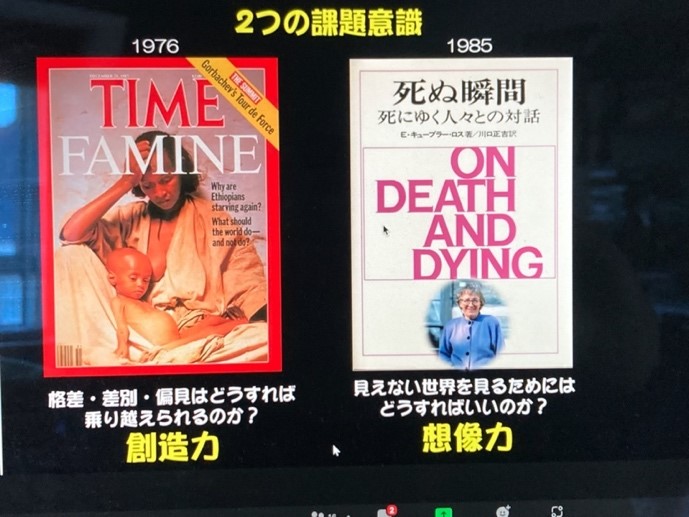
Creativity and Imagination
Professor Sugishita says that wherever you are you can help people. He stresses the importance of gathering resources and having direct experience when you come to study social issues. Going on-site means one experiences through the five senses such as sound and smell instead of just seeing a photograph from afar. In order to solve social issues, it is crucial to go to the location and witness the real situation of people suffering from difficult conditions, as it is hard to understand the reality of a situation from a distance.
Professor Sugishita considers poverty to be a ‘deprivation of capabilities’, by which he means it is important to look into the reasons which cause poverty and that requires redefining health vulnerabilities. He explains that the current definition centred around humans needs to be replaced by one which centres on the planet.
This new definition is necessary because damage to the planet means damage to human health.
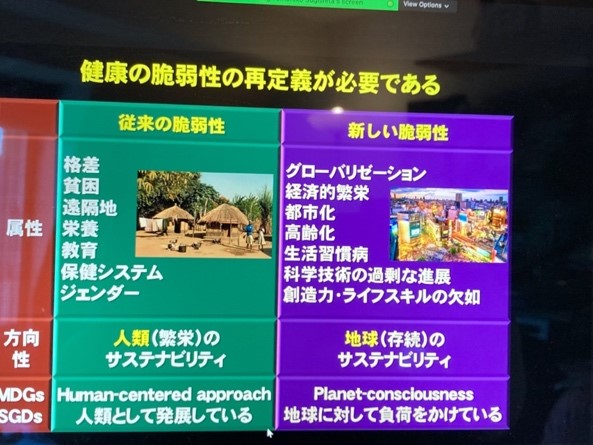
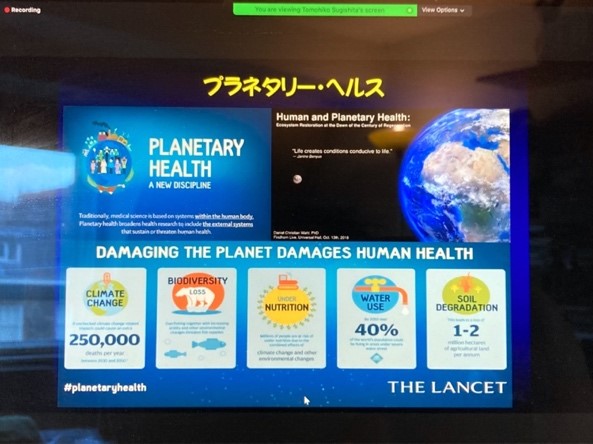
redefining health vulnerabilities
Professor Sugishita introduces four fields of career opportunities regarding global healthcare. They are: 1. research, 2. co-operation and entrepreneurship, 3. International Co-operation and 4. Development and Aid.
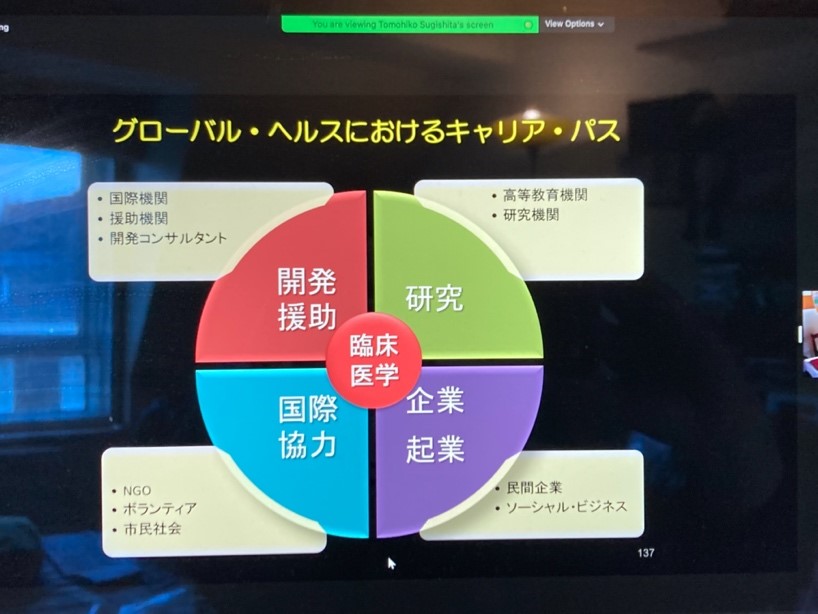
Career opportunities in Global Healthcare
Social change with creative thinking at its core aims to end the cycle of poverty, and promote nutrition, education, culture, health, the environment and gender equality.
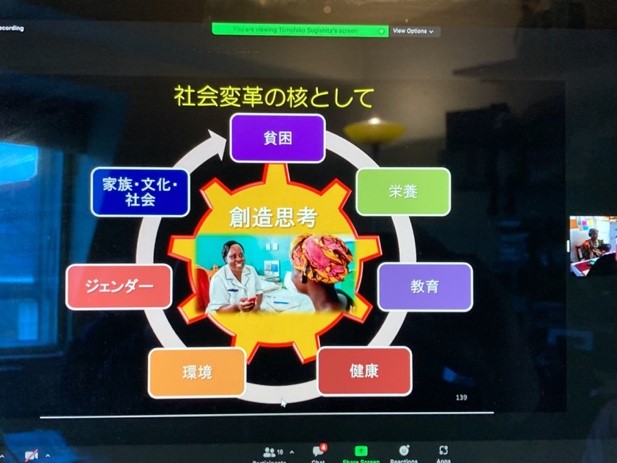
Cycle of Social change with Creative thinking
The last message of Professor Sugishita’s study meeting is that it is important to develop individual awareness of the consciousness of the planet and that education plays an important role in realising this mission.
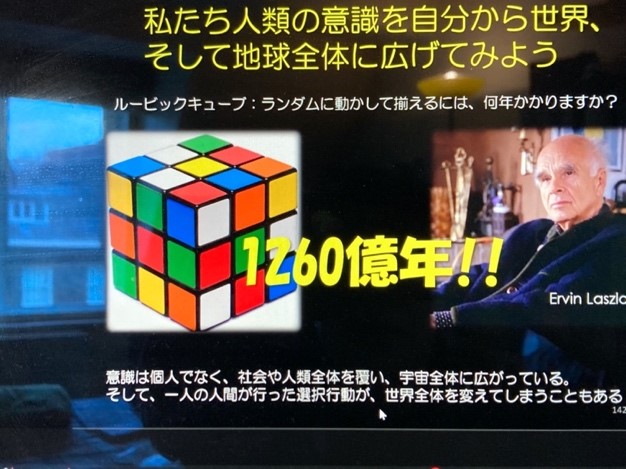
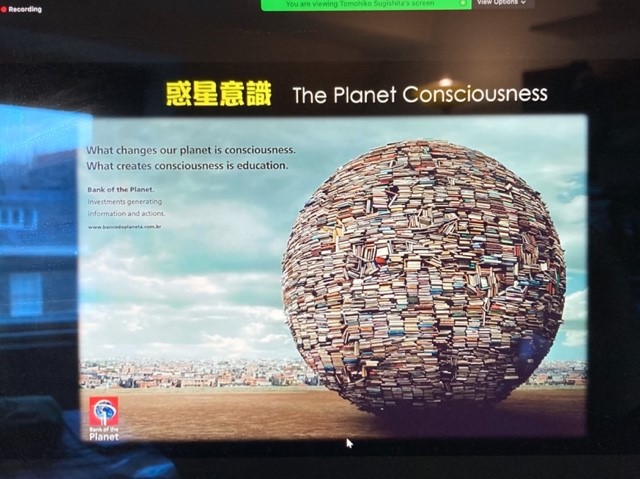
February Report
28 February 2022
Global Japan Office Coordinator
Taguchi Kazumi
The February London Report contains a brief update on the Language Exchange Club which has been running for over a year.
I have been organizing the Language Exchange Club since January 2021 and it is now in its second phase.
It began during the Covid restriction period when people’s daily activities were drastically reduced. The Office of Foreign Affairs at TUFS suggested the possibility of running some kind of interactive class between Japanese-speaking and English-speaking students. Thus, the Language Exchange Club was born. It is truly amazing that wherever we are in the world, people are now able to meet and discuss online.
In February, the world witnessed a sad setback to peace on the planet.
The well-known London landmark, the BT Tower, sent a message to Ukraine. All of us desperately seek a resolution to this conflict and the end to human suffering.
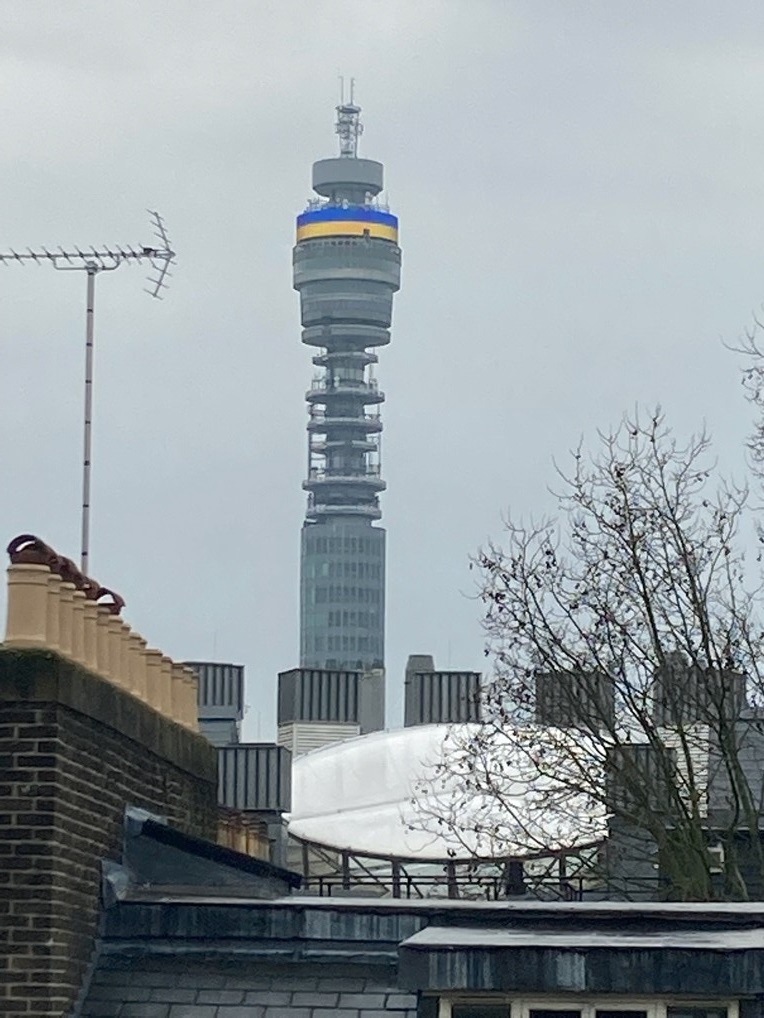
January Report
31 January 2022
Global Japan Office Coordinator
Taguchi Kazumi
Happy New Year, everyone. I hope it is a good year for all of us.
The January London Report features two exhibitions at the British Museum and the very first Minyo lesson at SOAS this year.
There were two exhibitions related to Japan at the British Museum. One was titled “Contemporary women artists of Japan”.
Six female Artists: Yamamoto Akane (born 1977), Shinoda Tôkô (1913-2021), Yoshida Chizuko (1924-2017), Kawaguchi Rinko (born 1972), Kobayashi Kiyoko (born 1947), Furuta Miyuki (born about 1952)
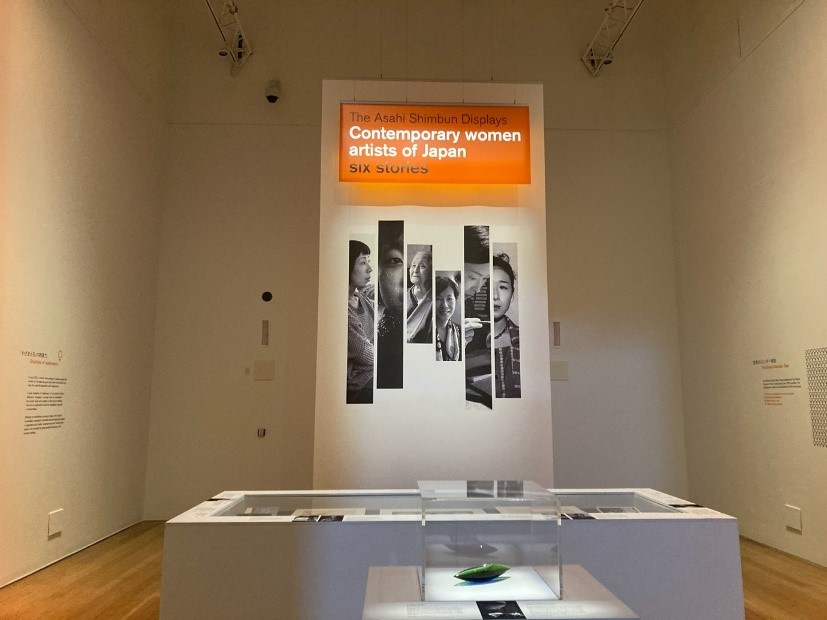
The Museum’s explanations about this exhibition are accurate and direct and provide a fascinating perspective on Japanese culture. I would like to quote the museum’s notes and translate them into Japanese.
“Shackles of ‘wakimaeru’
In early 2021, a senior male politician in Japan praised the women on his team because they knew not to talk for too long. He used the Japanese verb ‘wakimaeru’.
A basic definition of ‘wakimaeru’ is ‘to be able to tell the difference’. However, it can also mean ‘to understand the correct order and customs, and to act accordingly’. The word is applicable to anyone, regardless of gender or social status.
Although an established concept in Japan, this incident immediately unleashed a domestic and international backlash. In Japanese social media, ‘wakimae-nai onnna’ (‘women who refuse to be shackled by social position’) became a top trending hashtag.”
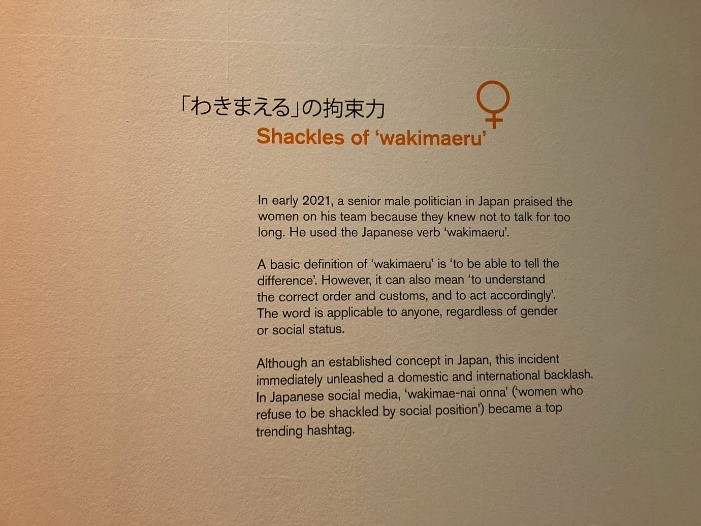
Collecting works by Japanese women
Women’s involvement in the arts has a long history in Japan. Female poets are recorded as early as the AD 700s. The Tale of Genji, written by Lady Murasaki (active about AD 1000), is considered a classic. More named women artists are known from the Edo period (1615-1868), many of whom were born into artistic families, or who chose to pursue an artistic career.
In the Museum’s Japanese collection, there are works made by about 4,500 men, but only 140 women. The Museum is seeking to address this imbalance by actively collecting modern and contemporary works created by Japanese women artists.
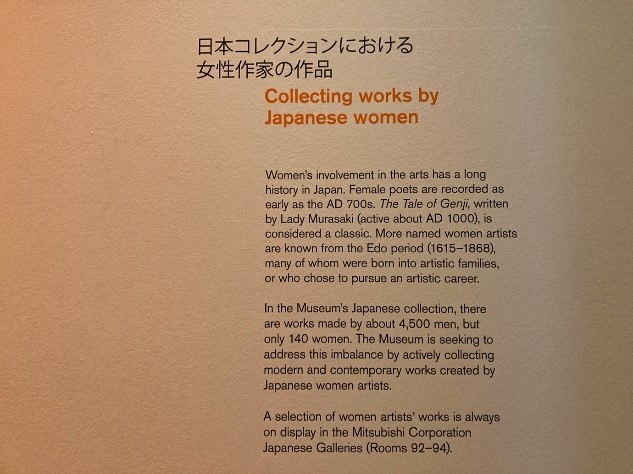
Contemporary women artists of Japan
Six stories
This exhibition showcases works created from the 1960s to the 2010s by six internationally acclaimed Japanese women artists.
Although each artist’s story is unique, and their work reflects their own vision, they all share a quiet sense of self-possession. Each of them has established their own path.
Significant social, legal and political changes since the 1960s have positively impacted on the position of women in Japanese society. However, as with many other nations, gender equality is still a work in progress.
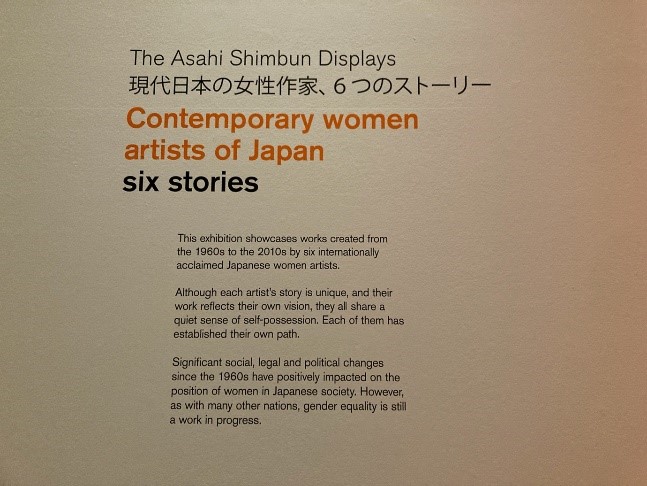
The global Gender Gap
The Global Gender Gap index, published by the World Economic Forum, benchmarks over 150 countries. The rankings are based on an assessment of four key areas:
1 Economic participation and opportunity
2 Education attainment
3 Health and survival
4 Political empowerment
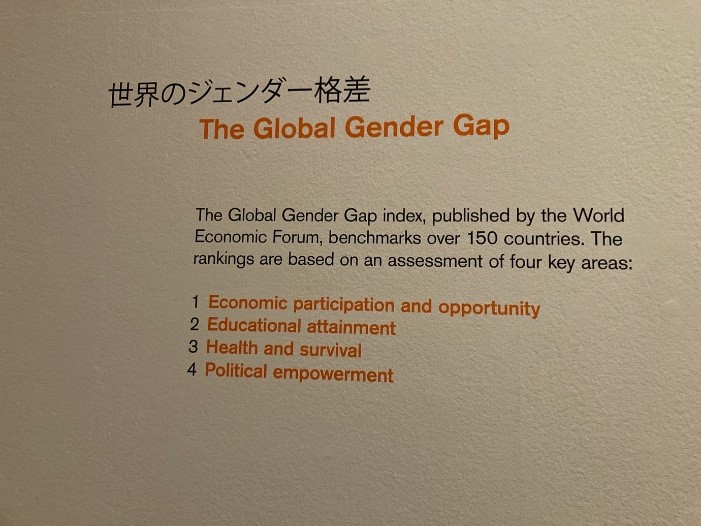
Out of the 158 countries covered in the 2021 report:
Iceland is ranked 1st
UK is ranked 23rd
Japan is ranked 120th
For all the countries listed in the index, closing the gender gap is still a work in progress, and true gender equality a goal to strive for.
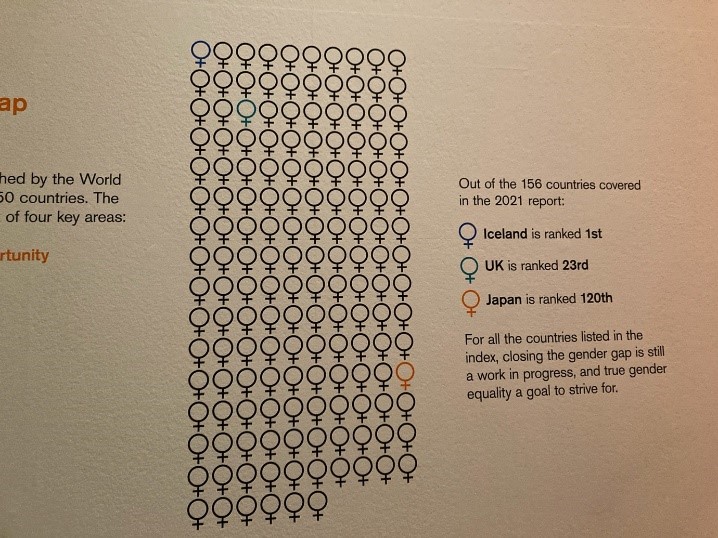
Any event featuring Hokusai is always very popular at the British Museum. On this occasion, the Museum chose to stage an exhibition of the great master’s picture books. In modern times, perhaps it would be best described as a Hokusai comic book. Whatever name you wish to give it, it certainly is a rich and superbly created manga!
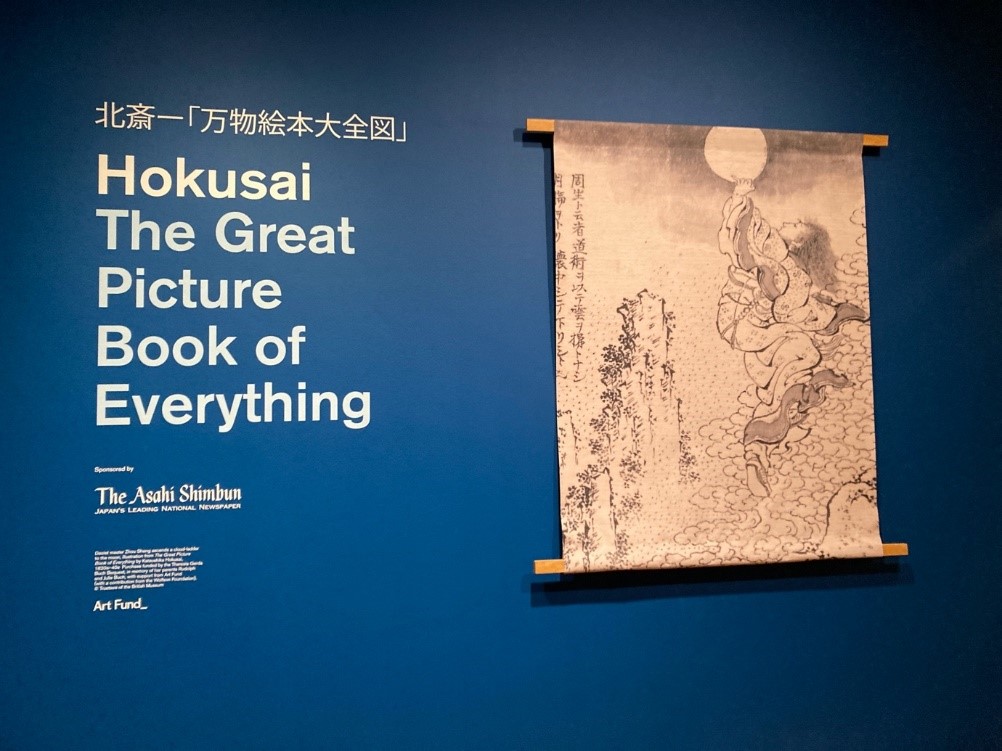
The SOAS Minyo group held their first face to face class for a long time at the beginning of the new year. And, under the instruction of Dr. David Hughes, we had great fun practicing songs such as Kurodabushi and TawaratsumiUta. Hibiki Ichikawa, the Tsugaru Shamisen Player and Akari Mochizuki, the Minyo-Enka singer gave a great rendition of Miyagi Nagamochi Uta. Interacting in the same room as fellow members has such a different dynamic compared to practice sessions via Zoom.
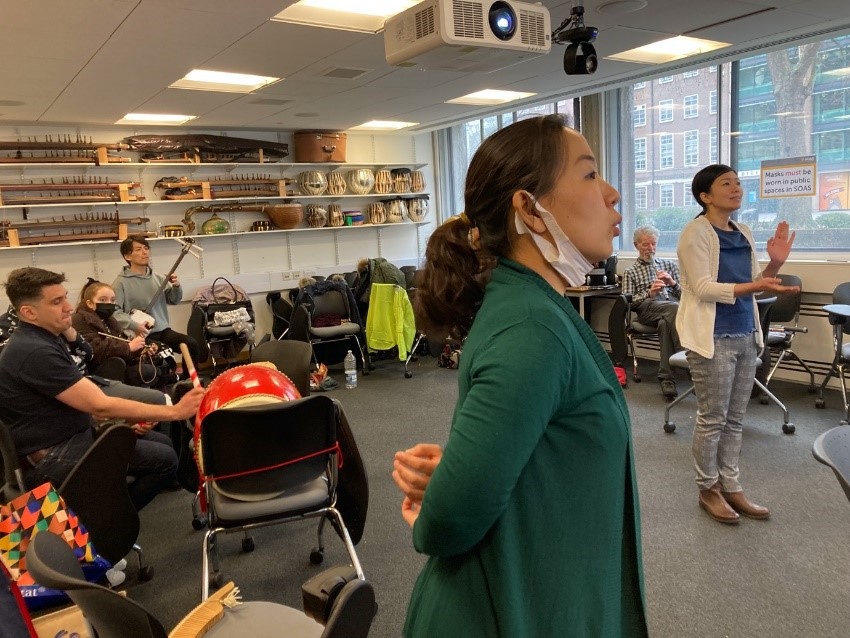
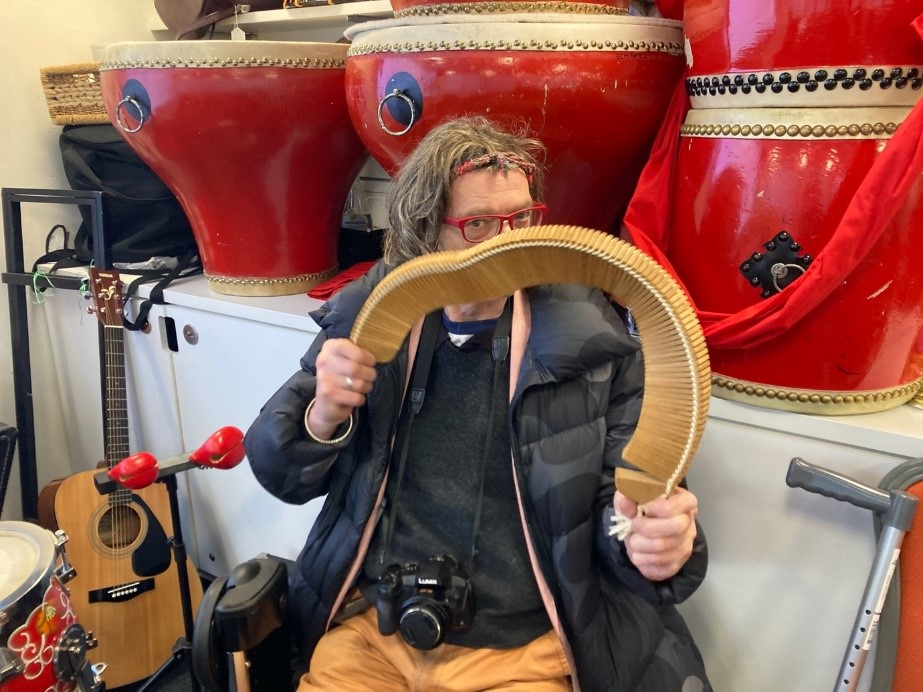
December Report
31 December 2021
Global Japan Office Coordinator
Taguchi Kazumi
The December London Report concerns a few events I have attended. Firstly, the birthday celebrations at the Exploding Cinema spectacular in the Cinema Museum, secondly a visit to edgy Hackney Wick, and finally a Christmas time trip to my local neighbourhood around Kings Cross and Holborn.
It was the thirtieth anniversary of the Exploding Cinema which is a collective of film makers who promote and make short films. I went to the event, as a friend of mine is a good friend of one of the organisers, Dr. Duncan Reekie.
The venue for the celebration, the Cinema Museum, is a fascinating location dedicated to the story of cinematography. The building itself is full of history and it is well worth visiting. Exploding Cinema made the very most of the setting, projecting colourful and engaging images all over the venue. Although Exploding Cinema welcome contributions from the public, this event concentrated on works created by its own members and the audience was thoroughly entertained.
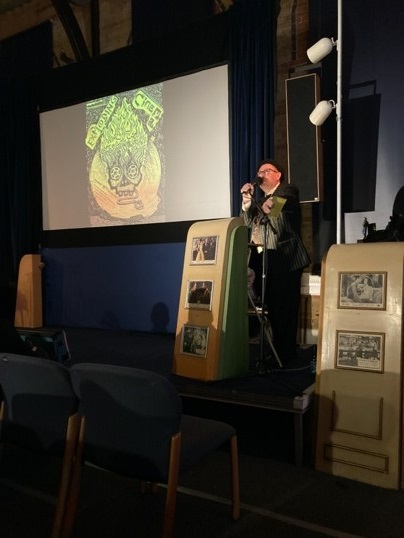
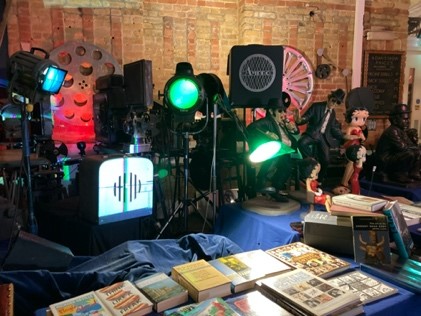
The venue.
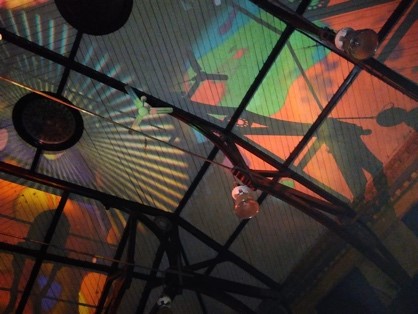
The moving images projected on the wall and ceiling.
My second trip was a journey to Hackney Wick, a district in the east of London which is attracting a lot of creative people due to the fact it is one of the more affordable places to live and work in the capital.
The music group I was in, in the 80s called Frank Chickens was asked to chat to a German podcast radio station called Munich 80000. The group’s leader, Kazuko Hohki, who has been creating her own theatre shows for many years, and I travelled to their studio to record our conversation with one of the station’s presenters.
Afterwards, the radio presenter, Marie, took us to see a DJ working in the unusual environment of a fixed narrow boat. Because of its affordability and creative atmosphere, many new bars and restaurants are popping up in Hackney Wick, especially around the station area.
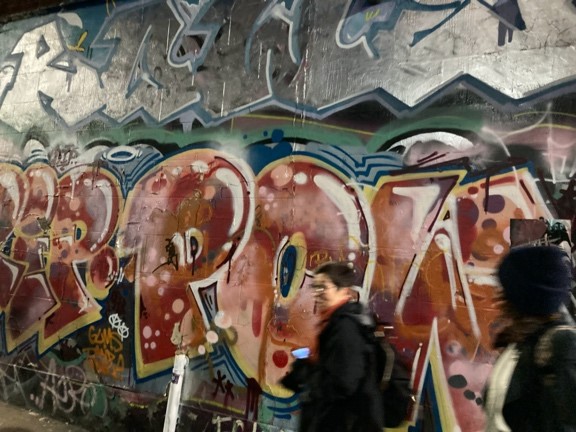
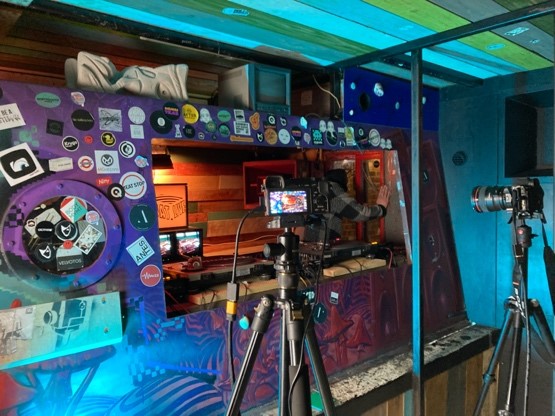
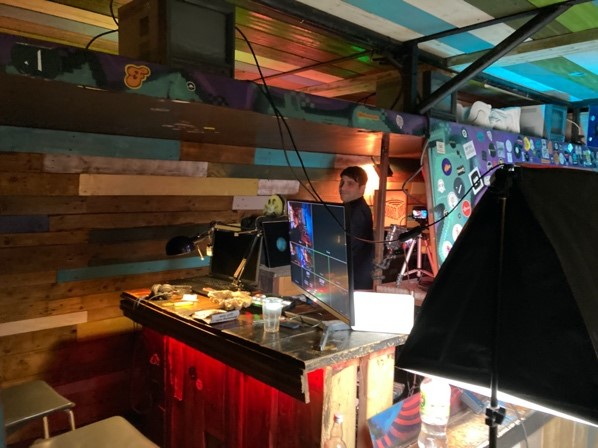
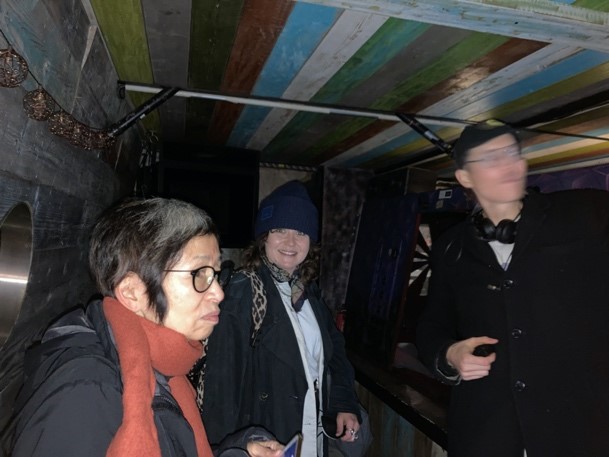
Finally, I’d like to show you some photos I took before Christmas in my neighbourhood, Kings Cross. People generally go mad shopping for last minute Christmas presents around this time of year, but things have been much quieter since Covid. Christmas decorations have also been more restrained and in line with the times.
Let us hope that the world will become a safer place to travel, live and enjoy our lives in 2022.
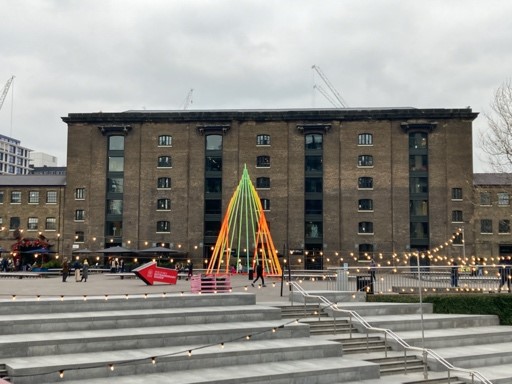
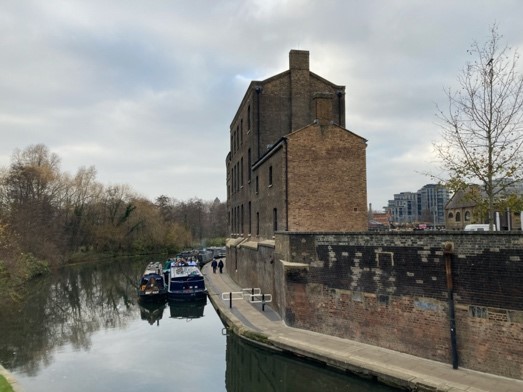
After crossing the bridge over a canal, you see the University of the Arts London which is situated alongside the canal.
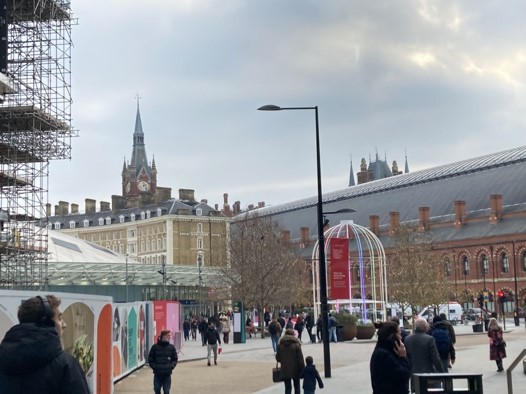
November Activity Report
30 November 2021
Global Japan Office Coordinator
Taguchi Kazumi
The November London Report is to tell you that we had three Language Exchange Club also talk about my business trip to Austria which I do apart from my work as a coordinator four hours per week. I would like to make comments on how measure against Covid is so different between the UK and Europe.
Currently, I have been organising the language exchange club for two students who continued to show interest in attending the club since its first stage of setting up period. I am planning to add one more pair in December. I am looking back and reviewing one year’s activity of Language Exchange Club which is not part of the course work and how it can develop considering the time difference and date which many students can join.
I work as a coordinator for 4 hours per week. I had a business trip to Austria for a week in November in other work I do. The first regulation that I encounter for the journey was that one have to wear a specific mask which was required by the Austrian authority, otherwise, you can’t abord to the airplaine.
Then, you have to present vaccination passport showing you had two vaccinations. It is necessary to show this when you enter the country, hotel, restaurant, bar, and café. There is no fuss as you can download the vaccination passport onto your smart phone. However, in England, there is no regulation to show vaccination passport at the moment.
I came across the demonstration march against covid vaccination in the central area of Wein where Opera theatre is situated on a day of arrival to Austria.
I stayed in Wein and the town in the upper Austria situated near city of Linz. I did PCR tests before attending the events. You can do test by yourself and submit the sample to nearest supermarket and the result were sent to your mail address the next day. The procedure was very simple and easy.
For my return journey, I went to München via Saltsburg by train. I submitted the necessary document for Covid related information online. There was no check on the document as it was before Austria went lock down. After crossing the border, the police came to check your passport and nothing else.
I stayed in München for a night and flew back to London the next day. The impression that you got of Germany by walking around the town was that it was a center of European economy, and you can sense it in the air. At the same time, I witnessed that there were many homeless people compare to Austria.
The same with Austria, you need to show your Vaccination passport everywhere you go.
After returning to London, that there is no regulation to show vaccination passport anywhere and to wear the mask. This short trip made me realize that there is difference being European Continent and the UK as Island.
October Activity Report
31 October 2021
Global Japan Office Coordinator
Taguchi Kazumi
The October London Report is about something I have briefly mentioned before: my post-doctoral project. It consists of 8 videos of Chinese poems composed by the Japanese novelist, Natsume Sôseki.
Each video features one of Sôseki’s Chinese poems, gives a reading in Japanese and English translation and is accompanied by visual images and sound/music which I edited.
The videos were uploaded onto YouTube this month, and I would like to share them with you.
Please have a look when you have a spare moment. I would be delighted if you find them of interest.
The link is below.
https://www.youtube.com/channel/UCcaw9DmuB5-31oGJB6bkfbA/featured
I am planning to make series 2 & 3 in the future.
September Activity Report
30 September 2021
Global Japan Office Coordinator
Taguchi Kazumi
The September London Report is about a boat trip down the river Thames.
People are still concerned about meeting indoors, but we had a few warm days in London in the middle of September, and many who had followed the rules and stayed inside during lockdown took the opportunity to come out en masse and enjoy some time outdoors.
Our boat trip began in the centre of town, at the Embankment. We were going east, heading for Greenwich which is famous for its historic Observatory.
Along the way, on the other side of the river from the Embankment, you can see the London Eye, a gigantic wheel with a panoramic view of London, and the Royal Festival Hall.
Once the boat started to move, one of the cabin crew spoke through a microphone and announced “I am not a professional tour guide, but I would like to explain a bit about a few of the interesting landmarks you can see from the boat” after his introductory speech, he began to give us the historical backgrounds of many of the sights on both sides of the river Thames.
It was a very pleasant boat trip indeed. And so enjoyable to listen to the sound of the waves, look at the blue sky and observe the many fascinating buildings and locations that came into view. Luckily, we were in time to see the Tower Bridge open and had plenty of opportunity to take photographs. It was a thoroughly delightful boat trip featuring lovely postcard-like scenes and vistas.
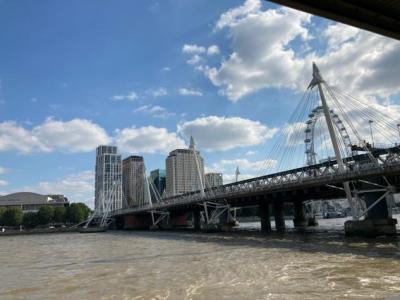





August Activity Report
31 August 2021
Global Japan Office Coordinator
Taguchi Kazumi
The August London Report is about how Japanese food has been absorbed into the local cuisine in Britain through Food Culture. I went to a takeaway Sushi specialist shop called Sushi Heads in North London to find out all about it.
To get there, you head north on the Victoria line tube and get off at Seven sisters tube station. You then walk about 15 to 20 minutes and find Sushi Heads right in front of you.
Sushi and Ramen culture has been popular and established in London for quite some time now. It is normal to find sushi in plastic containers at the big supermarkets. However, the reality is not as sweet as all that, and you are often disappointed by the end product. If you want to eat delicious sushi, you have to go to a restaurant and therefore need a much bigger budget.
Sushi Heads is the place where your dreams of eating sushi at a reasonable price are realised. Owner/chef, Naomi Lee-Iwamoto opened Sushi Heads five years ago. She took the name of the shop from her favorite band, Ian Dury & The Blockheads. Naomi operates everything on her own from making sushi, purchasing materials, to managing the business and PR.
I had a chance to observe how the business is going. Sushi Heads looks popular with the local community. Customers were familiar with the range of sushi on offer, and they all seemed to have their favourites.
Naomi is from Osaka and goes by the friendly nickname of “The aunty from Osaka”. She works swiftly rolling her sushi with passion and pride and is doing a great job providing Londoners with superb Japanese food at a reasonable price.
I know a bit about sushi and I can truly say her sushi was absolutely delicious. I have no hesitation in recommending Sushi Heads. If you’re ever in London and fancy eating sumptuous Japanese food at a reasonable price, you know where to go!


Sushi Heads at Seven Sisters


The owner/chef, Naomi Lee-Iwamoto



Inside the shop, sales counter, shelves jam-packed with exciting products, graffiti


Sushi Heads sells Tableware and also has other original goods such as mugs and tea towels on sale.
July Activity Report
31 July 2021
Global Japan Office Coordinator
Taguchi Kazumi
The July London Report is about the sports fever which has been sweeping the UK.
Some of the important games in the Euro soccer championship took place in London in July. After the government announced that people could gather outdoors if they were vaccinated or had a negative test, football fans couldn’t wait to once again get together in a stadium.
The crowd that gathered at the Wembley Stadium for the final were excited well before the match started since it had been 55 years since the England team had played in a match of such importance. Unfortunately, the England team lost after a penalty shootout. The team, however, showed great spirit and supported each other throughout the competition. It seems the England team has a very organised and supportive system for their young players.
There were some comments of a racist nature after the match. However, in present day UK, people have become very sensitive to racial discrimination and language; such racist actions are not tolerated. The reaction to these offensive remarks saw many messages of support for the black players on all media platforms.
The other annual sports event in July is the Wimbledon Tennis Championship. After a two-year break, spectators were thrilled to watch live tennis once again.
The final sports event of July was the controversial 2020 Tokyo Olympics which went ahead with a promise to the nation that “Safety and Security” would be the priority. This report will now take a look at how the BBC went about their presentation of the event.
At first glance, you imagine that the studio broadcasting the Olympics is located in the corner of the top floor of a tall skyscraper. The view seen through the full glass windows of the studio behind the presenters corresponds exactly to a typical Japanese city skyline: the architecture, the interiors, the names of the sports advertised and illuminated on the top of the buildings. On top of that Mt. Fuji can be seen in the distance. The studio is slightly crazy with a Zen Garden feel emphasized by a pond with carp swimming beneath the main set.
The trick to this crazy studio is that the background is constructed by computer graphics. In actual fact, the studio the show is filmed in consists of the broadcasters at their desks and a green backdrop behind. The background is totally digitally controlled. In a certain sense, it proves that a broadcasting team can take advantage of cyber space to make an Olympic programme in a local studio.
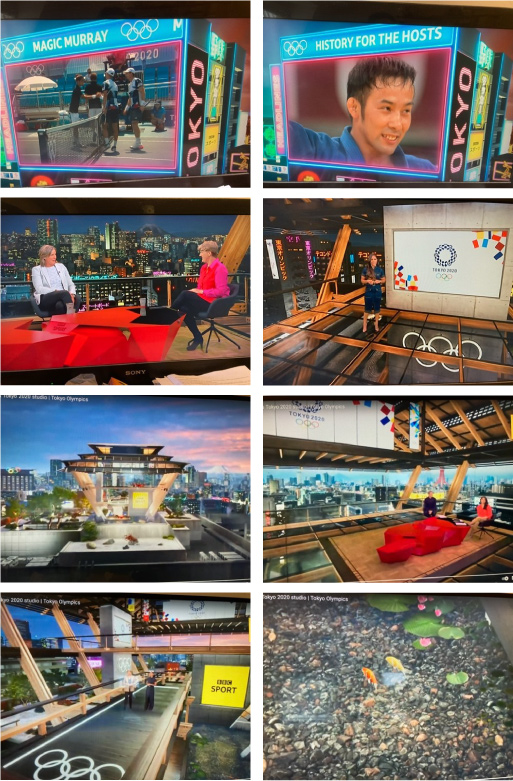

June Activity Report
30 June 2021
Global Japan Office Coordinator
Taguchi Kazumi
The June London report is about the G7 Summit held between the 11th and 13th of June in Cornwall in the south-west of England. We will be taking a look at how the media reported the meeting.
Carbis bay in Cornwall where the G7 Summit was held is usually popular with tourists who enjoy its attractive beaches and amenities. But on this occasion, it became the main stage for world politics in what is regarded as one of the most important events in the UK this year. Queen Elizabeth, Prince Charles, and Prince William all welcomed the arrival of some of the world’s most high-profile politicians.
As we all know, among the important issues discussed at the G7 Summit were global warming and sustainable energy. Many environmental groups gathered near Carbis bay to express their desire to protect the earth by singing and dancing through the streets and across the beaches.
The images shown below are taken from TV coverage of the G7 Summit. The inflatable dolls of President Joe Biden and Prime Minister Boris Johnson were created by protesters and then floated out to sea. This is a clear example of a quintessential characteristic of British people: a love of satirising and sending-up important issues and people.
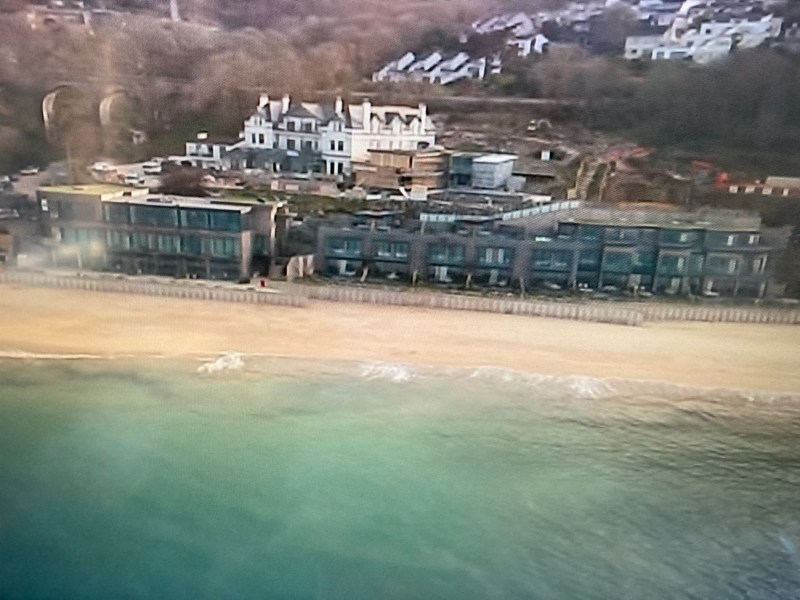
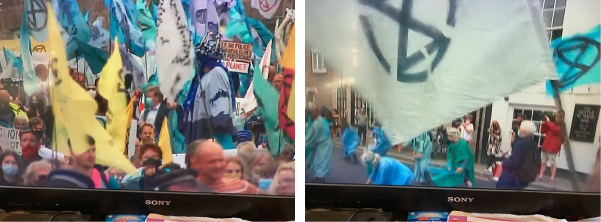


May Activity Report
31 May 2021
Global Japan Office Coordinator
Taguchi Kazumi
The final part of the month of May saw unstable weather in London. There were hailstones and it was so cold we still had to turn our heaters on. However, when the sun came out, we enjoyed a beautiful clear blue sky and a glorious green in the gardens, squares and streets in the SOAS area.
Horticulture in the UK is very advanced and, all the green areas around the Universities are well looked after. It’s fascinating to watch them change their looks through the course of the seasons.
The largest square near SOAS is Russell Square and it has a tube station nearby named after it. It takes 1 minutes to get to the British Museum North entrance and around 10 minutes to get to the main gate. So, you regularly see tourists passing through. Now, the fountain is active and ready for a hot summer’s day. The photo below on the right-hand side is of a book shop. It looks like a scene from Harry Potter. And it doesn’t disappoint your expectations. The inside of the building is like a maze and is very amusing. Any time you feel like it, you also have the option of sitting down and reading in a chair in the corner.
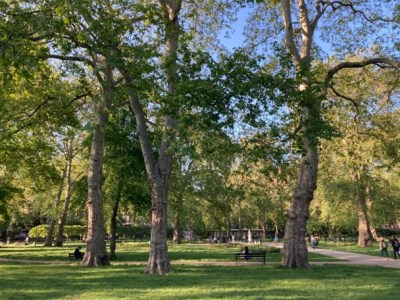
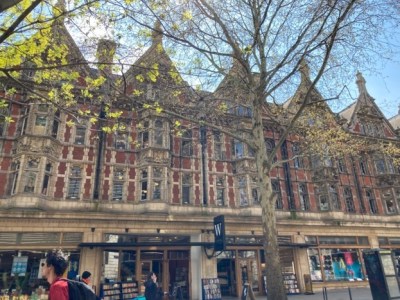
Tavistock square is situated 1 block north of Russell Square. This square has many memorials; A cherry blossom tree for world peace, a statue of Gandhi, a memorial for conscientious objectors, and a memorial for the victims of the terrorist attack in July 2005. In one corner, there are maple trees and bamboo bushes which remind me very much of a Japanese garden. It feels as if you are bathing under the trees in the middle of the city.The photo on the left hand-side is of the outside fence of the square and the vehicle in red is a bicycle taxi. The photo on the right is from inside the square.
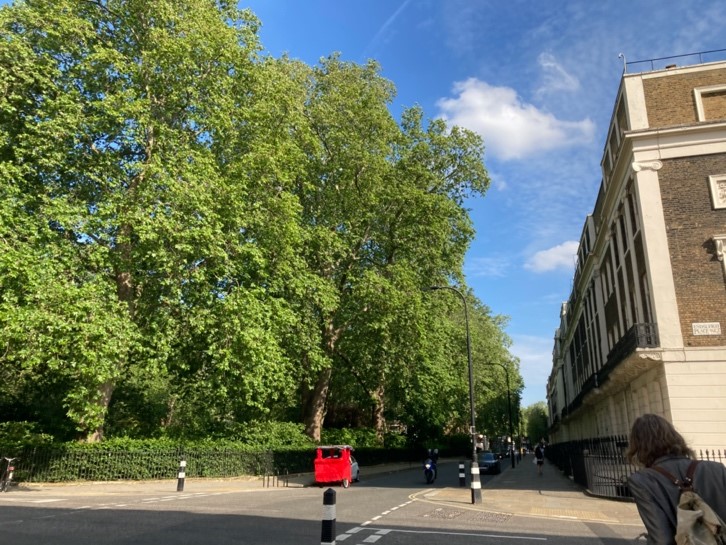
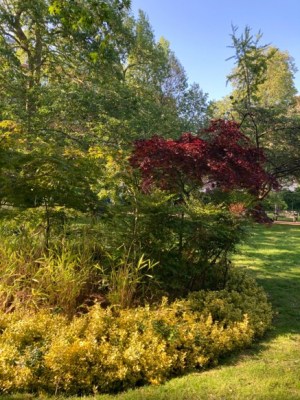
Going 1 block along from Tavistock Square, you find Gordon Square. This square has what you might call a ‘home garden look’. There is a mini café and the square provides many a relaxing moment. Right now, it is the Rose season!
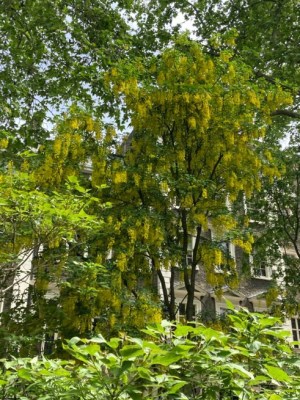
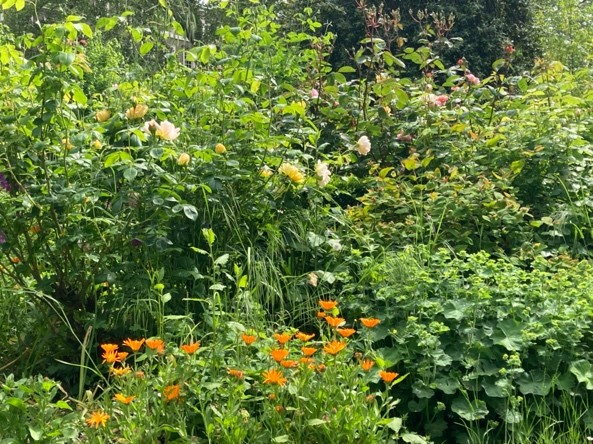
The photograph below is of a small fashionable street south-east of Russell Square. This shop seems to specialise in horse riding equipment.
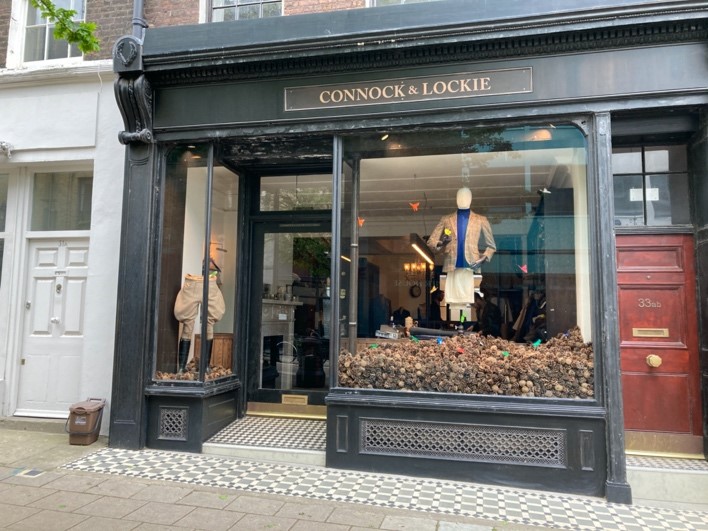
The language exchange club has been going for a while now and we have a small group of interested people. I would like to start the group language exchange club when the new academic year starts in Autumn.
Here is some personal and rather uplifting news I would like to share with my readers. I am going to receive a Knowledge-Exchange Grant from SOAS for my post doc project. I have to complete it within two months. I will keep you informed of my progress in this fascinating venture.
April Activity Report
30 April 2021
Global Japan Office Coordinator
Taguchi Kazumi
The April London Report will cover the Language Exchange Club, a Chinese drumming course and a Qin course that the GJO co-ordinator took part in. It will also take a look at the situation in the UK as lockdown slowly comes to an end.
It has been a busy period in both Japan where the new academic year has just started and in the UK where students are preparing for their end of year exams. The language exchange club is going strong and will continue as long as there is a demand.
The SOAS Music department organised a Chinese drumming course taught by a talented percussionist, Beibei Wang. You may remember her, as I featured Ms. Wang in a past report and wrote about her upcoming tour to China in which she is collaborating with the BBC Symphony Orchestra. I also had the privilege of watching her in a rehearsal at the BBC Maida Vale studios. The course featured one two-hour class a week and was jam-packed with things to learn. Ms. Wang is a brilliant teacher, full of passion, skill and enthusiasm.
The other activity that I have been doing is joining a Qin intermediate class. The course is taught by Dr. Cheng Yu. It is a group lesson on Zoom in which the students learn assigned tunes at a fairly fast pace. We all learn from our homes which is very comfortable in many ways and saves time and energy in terms of transport etc. Personally, I find it works as a substitute for meditation; playing Qin is a marvellous way to relax.
The UK is gradually rolling back the lockdown. However, it is still not possible to go on holiday abroad. To compensate for the situation, domestic holidays are becoming popular. Right now, people are studying the progress and efficacy of the vaccination roll-out with intense interest.

